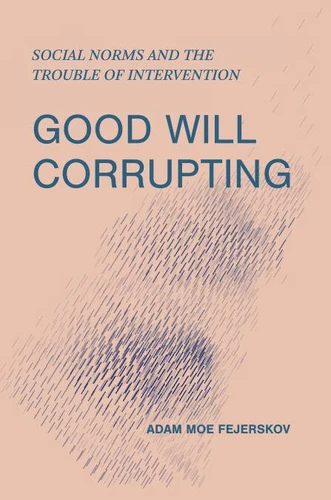Good Will Corrupting. Social Norms and the Trouble of Intervention
Par :Formats :
Disponible dans votre compte client Decitre ou Furet du Nord dès validation de votre commande. Le format ePub protégé est :
- Compatible avec une lecture sur My Vivlio (smartphone, tablette, ordinateur)
- Compatible avec une lecture sur liseuses Vivlio
- Pour les liseuses autres que Vivlio, vous devez utiliser le logiciel Adobe Digital Edition. Non compatible avec la lecture sur les liseuses Kindle, Remarkable et Sony
- Non compatible avec un achat hors France métropolitaine
 , qui est-ce ?
, qui est-ce ?Notre partenaire de plateforme de lecture numérique où vous retrouverez l'ensemble de vos ebooks gratuitement
Pour en savoir plus sur nos ebooks, consultez notre aide en ligne ici
- Nombre de pages238
- FormatePub
- ISBN978-0-262-38308-0
- EAN9780262383080
- Date de parution27/05/2025
- Protection num.Adobe DRM
- Taille3 Mo
- Infos supplémentairesepub
- ÉditeurThe MIT Press
Résumé
A fascinating investigation of the social norm movement and the implications of a powerful collective pursuing radical social change through contentious interventions across the Global South. Social change is slow and difficult to achieve. Dissatisfied with the lack of progress in eliminating inequalities, a powerful collective has converged around social norms as the next silver bullet to accelerate social change around the world.
The movement is currently mobilizing immense funding, garnering the attention of powerful policy makers, and experimenting with radical interventions across the Global South. In Good Will Corrupting, Adam Fejerskov takes us from the Ethiopian highlands to convention halls in Marrakech, and from fourteenth-century palazzos in Florence to both the West and East Coasts of the US, to understand this growing movement pushing social norm interventions in the name of progress, development, and health.
A powerful scientific and moral project, the social norm collective harnesses insights from social psychology, behavioral economics, and game theory in its attempt to radically improve the lives of people in poor communities around the world. Good Will Corrupting traces not just the ambitions and impacts of the collective but also its inherent struggles to give meaning to this idea and bring it to life through interventions.
Rooted in empirical explorations and feminist thought, this book shows just how incremental, nonlinear, and endogenous social and normative change often turns out to be and argues for a decolonization of efforts to change social norms around the world.
The movement is currently mobilizing immense funding, garnering the attention of powerful policy makers, and experimenting with radical interventions across the Global South. In Good Will Corrupting, Adam Fejerskov takes us from the Ethiopian highlands to convention halls in Marrakech, and from fourteenth-century palazzos in Florence to both the West and East Coasts of the US, to understand this growing movement pushing social norm interventions in the name of progress, development, and health.
A powerful scientific and moral project, the social norm collective harnesses insights from social psychology, behavioral economics, and game theory in its attempt to radically improve the lives of people in poor communities around the world. Good Will Corrupting traces not just the ambitions and impacts of the collective but also its inherent struggles to give meaning to this idea and bring it to life through interventions.
Rooted in empirical explorations and feminist thought, this book shows just how incremental, nonlinear, and endogenous social and normative change often turns out to be and argues for a decolonization of efforts to change social norms around the world.
A fascinating investigation of the social norm movement and the implications of a powerful collective pursuing radical social change through contentious interventions across the Global South. Social change is slow and difficult to achieve. Dissatisfied with the lack of progress in eliminating inequalities, a powerful collective has converged around social norms as the next silver bullet to accelerate social change around the world.
The movement is currently mobilizing immense funding, garnering the attention of powerful policy makers, and experimenting with radical interventions across the Global South. In Good Will Corrupting, Adam Fejerskov takes us from the Ethiopian highlands to convention halls in Marrakech, and from fourteenth-century palazzos in Florence to both the West and East Coasts of the US, to understand this growing movement pushing social norm interventions in the name of progress, development, and health.
A powerful scientific and moral project, the social norm collective harnesses insights from social psychology, behavioral economics, and game theory in its attempt to radically improve the lives of people in poor communities around the world. Good Will Corrupting traces not just the ambitions and impacts of the collective but also its inherent struggles to give meaning to this idea and bring it to life through interventions.
Rooted in empirical explorations and feminist thought, this book shows just how incremental, nonlinear, and endogenous social and normative change often turns out to be and argues for a decolonization of efforts to change social norms around the world.
The movement is currently mobilizing immense funding, garnering the attention of powerful policy makers, and experimenting with radical interventions across the Global South. In Good Will Corrupting, Adam Fejerskov takes us from the Ethiopian highlands to convention halls in Marrakech, and from fourteenth-century palazzos in Florence to both the West and East Coasts of the US, to understand this growing movement pushing social norm interventions in the name of progress, development, and health.
A powerful scientific and moral project, the social norm collective harnesses insights from social psychology, behavioral economics, and game theory in its attempt to radically improve the lives of people in poor communities around the world. Good Will Corrupting traces not just the ambitions and impacts of the collective but also its inherent struggles to give meaning to this idea and bring it to life through interventions.
Rooted in empirical explorations and feminist thought, this book shows just how incremental, nonlinear, and endogenous social and normative change often turns out to be and argues for a decolonization of efforts to change social norms around the world.



